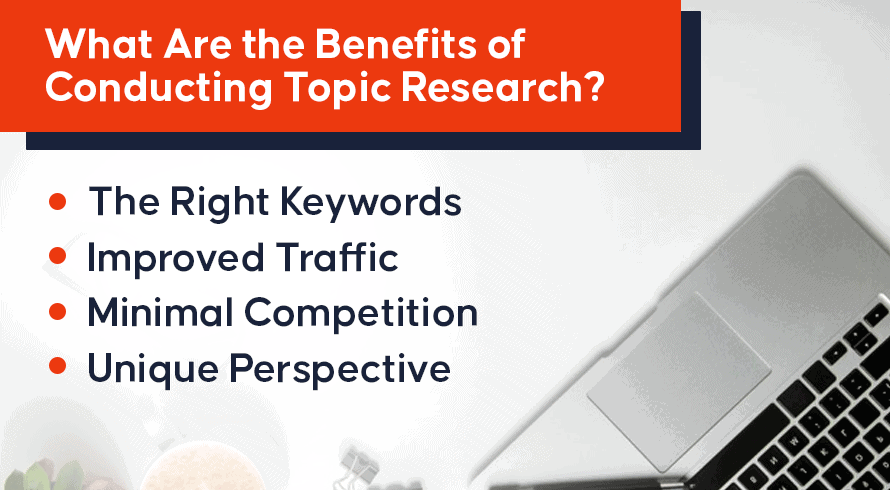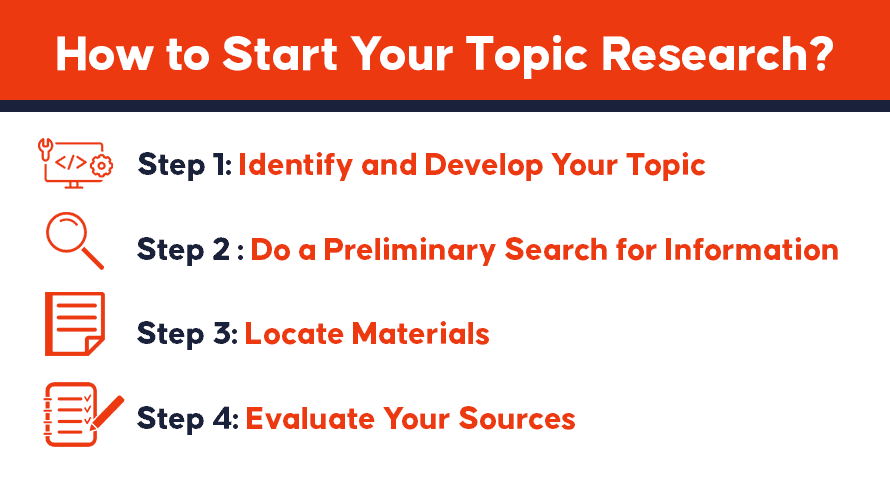Inquivix HQ
1-903, 18 Eonju-ro 146-gil,
Gangnam-gu, Seoul, Korea
06057

When you are writing, it is important to have a good idea of what you are writing about. This means that you need to do some topic research before you even start putting pen to paper (or fingers to keyboard). This preliminary research will help you to get a good understanding of the topic and also help to generate ideas for your content. Then you can move along the keyword research process for search engine optimization (SEO).
Making good use of topic research is the kind of thing that can make you stand out in today’s crowded content marketing space. If you are writing about the same thing as everyone else, then it will be difficult to achieve much success.
Also, if you have a good understanding of the topic, then it is likely that your content will be more useful. Instead of just regurgitating information from other sources, your own unique perspective and knowledge can help to make your content stand out.
Why Topic Research Matters the Most in Keyword Research?
Before you can do any SEO keyword research, it’s a good idea to do some topic research. This will help you to identify the best keywords since you will have a much better understanding of how your topic relates to different search queries.
This is important because it is always possible to go out and find some new keywords, but it is difficult to verify how well they will do. It’s much better to focus on getting more traffic from the keywords that you already know are popular instead of focusing on ones that might or might not work.
What Are the Benefits of Conducting Topic Research?
There are a number of benefits to prepping before you start writing. These include:

The Right Keywords
Using topic research to find the right keywords will help to maximize your content’s ability to attract traffic. Without the necessary keywords, hardly anyone will find and read what you write!
Improved Traffic
As mentioned above, using the best keywords for your content will result in increased traffic. This is because the right keywords will match up with search terms used by your target audience, resulting in more visitors to your site.
Minimal Competition
By identifying a topic that no one else is writing about, you will have a much better chance of standing out from the competition and attracting your target audience. Many people focus on topics where they compete for traffic with thousands of other content creators. This means your chances of success are limited as you need to claw your way up from the bottom.
Unique Perspective
In many cases, keyword and topic research can be a great source of inspiration for your content idea. You may find that through your research you get some really unique ideas and perspectives on the topic that others have not considered. This means it is easier to create something interesting and actionable.
What Is Content Brainstorming?
Once you have completed your topic research, it is time to start brainstorming content ideas. This is the process of coming up with ideas for content that will help you to achieve your goals.
The best way to do this is by using a mind map. This will help you to see all of the potential ideas that you have and also how they relate to each other. It also makes it easier to organize the ideas into a logical structure that makes sense.
When you brainstorm content ideas, it’s important to have a good mix of different types of content. For example, you may want to look at blog posts, videos and infographics as part of your strategy. If you focus on just one type of content, you will quickly find that your audience becomes bored.
Why Is It Important to Have a Brainstorming Process?
There are a number of reasons why it is important to have a process for brainstorming content ideas. These include:

Creates Structure
Without a process, it is easy to get lost and start creating content that is not going to help you achieve your goals. By using a process, you will be able to stay on track and create the content that you need.
Efficient
The process will help you to be more efficient when it comes to creating content. This is because you will have a system that you can use to generate ideas quickly and easily.
Improved Quality
When you have a process, it is easier to maintain quality control over your content. This is because you will have specific steps that you follow to make sure that everything is of the highest quality.
How to Start Your Topic Research?

We have discussed topic research and content brainstorming with their benefits. So how to start your topic research? Here are four steps to help your research process.
Step 1: Identify and Develop Your Topic
This is the first stage in the topic research process. It is where you will need to sit down and think about your topic area. You should start by building a list of potential topics that will work well for you, based on what you already know about your niche.
Step 2 : Do a Preliminary Search for Information
Once you have your list of potential topics, it is time to start doing some research. This will help you to narrow down your options and find the best topic for you. You can do this by using a variety of different resources.
Step 3: Locate Materials
Once you have found your topic, the next step is to find the relevant materials that you will need for your content. Searching for materials relevant for you can be intimidating and time-consuming, nevertheless, it needs to be done. You may have to go through various types of resources from simple blog posts or videos to academic papers.
Step 4: Evaluate Your Sources
Once you have completed the research process, the next step is to evaluate each of your sources. This will help you to find out which options are best suited to your topic so you can use them as a reference point in future posts. You should also take into account the style and tone of your blog so that you can create content that is in line with your overall branding.
How to Do Keyword Research for SEO?

Once you have decided on a topic for your new content, the Next step is to perform keyword research. This will help you to narrow down your scope and also identify potential keywords to help with your SEO. There are a few areas you need to pay attention to when identifying keywords for your content.
Understand the Three Main Factors for Choosing Good Keywords
When it comes to choosing good keywords for your SEO, there are three main factors that you will need to take into account:
Relevance
The keyword needs to be relevant to your content so that you can attract the right audience. Ask yourself whether your keywords match the users’ search intent.
Authority
The keyword should have a high authority so that you can rank well in the search engines.
Search Volume
The keyword should have a high search volume so that you can drive relevant traffic to your site. Using highly searched keywords will give your content more visibility.
Check for a Mix of Head Terms and Long Tail Keywords
When doing your keyword research, you should aim to find a mix of head terms and long-tail keywords. Head terms are shorter, more generic keywords, while long-tail keywords are longer and more specific. Long-tail keywords are generally easier to rank for, but they also have a lower search volume.
Competitors Ranking
If you find where your competitors are ranking for your target keyword, then it helps you to consider whether to go ahead with the same or target a different keyword. Google Analytics is a great way to help you in this. However, it is also important to keep in mind the relevance and authority of the keyword so that you can still rank well in the search engine result pages (SERPs).
Keyword Planner
Maintaining a keyword planner is a great way to be on top of your research process. You can do this by keeping keyword lists manually but it is advisable to use tools. There are a number of different tools available to help you with keyword research, so it is important to choose one which works best for you. A commonly used keyword research tool is Google Adwords Keyword Planner. This is one of the most popular tools for keyword research and it is free to use. It allows you to get traffic estimates for specific keywords and also gives you information on the competition level and how often the keyword is being searched for.
How to Use Keywords in Your Content for SEO?

Keywords help to make your content more relevant and easier for readers to find. This means that they can drive traffic through search engines, increasing the number of people who will be visiting your site on a regular basis. However, it is important not to overuse keywords as this can look unnatural and put readers off. After your keyword research, there are a few more steps for you to follow to optimize your content with those keywords.
Where to Use Keywords On A Page?
There are a number of places where you can use keywords on a page, including:
Use Keywords in Your Meta Description
This will make it easier for search engines to find your page when users enter relevant keywords in the search box.
Insert Keywords in Your SEO Title Tag
This will give search engines an idea of what your page is all about. However, you should also use keywords in the title so that they are incorporated into the headline as well.
Use Keywords in Your Article Title
If you want to rank well for a specific keyword, then it is important to include this in your article title. This will help search engines find the content and increase the number of keywords that you are ranking for.
Insert Keywords Throughout the Article
You should use the keyword a few times throughout the article itself, but you need to be careful not to overdo it. If you use the keyword too many times, it will look unnatural and could negatively affect your ranking.
Conclusion
Conducting a detailed topic research analysis for SEO is one of the main steps in creating great content. It is the first step in the keyword research process. Creating content optimized for SEO is crucial for digital marketing as well as social media marketing. Using keywords in your content is an important part of SEO. By following the tips mentioned in this article, you can help to improve your ranking and drive more traffic to your site.
